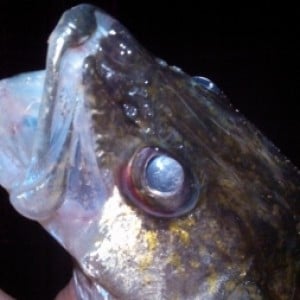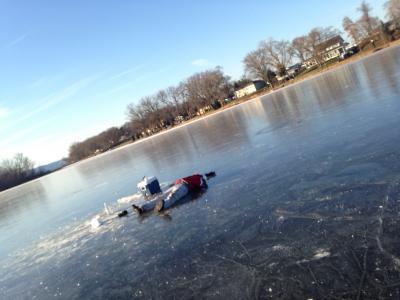So, about 5 years or so ago I kept a little batch of 6 Crappies or so ice fishing. Not a rare occurrence by any means. Had these lil’ buggers out on the ice for five hours or so, brought ’em home, left them outside for a few more hours before cleaning them. As I thawed them out in the sink they all came back to life. Cleaned four and threw the other two in the aquarium for the heck of it. The two aquarium dwellers proceeded to live, eat, and do their normal business with no apparent side effects. Fast forward to today.. Caught a few last night, left ’em out in the snowbank overnight…18 hours later they also came back to life! Never had this happen with any other species..Anyone else notice the same thing? Quite strange.
IDO » Forums » Fishing Forums » Ice Fishing Forum » Cryogenic Crappies?
Cryogenic Crappies?
-
January 13, 2014 at 10:23 am #1379409
Yeah… every time I go fishing

Perch, crappie, bluegill, saugers, walleye, trout, and bass.
January 13, 2014 at 10:52 am #1379422I’m not talking about a fish merely wiggling around because of nerves etc. I’m talking about them coming back to life and being fully functional. We talk about limiting time out of water for proper releases so gills and eyes dont freeze etc. These fish are swimming around after having no oxygen etc. for many, many hours and exhibiting no signs of brain or other damage. Find it quite interesting.
January 13, 2014 at 11:04 am #1379427Quote:
…exhibiting no signs of brain or other damage.
Did you give them some sort of crappie quiz?
I find it surprising that the gills would not be damaged to the point that they would not live.
It’s pretty amazing that they would end up swimming around without exhibiting side affects. They are cold blooded, so it is not completely surprising.
January 13, 2014 at 11:21 am #1379434I’ve noticed the same thing with panfish. A couple weeks ago, I had a few bluegills that were stiff as a board. Set them in the entry way and sampled a beer (or two) while they – and I – thawed out. Couple hours later I began to fillet and they were flopping around! Pretty amazing. Heck, seems like sometimes I can’t keep a walleye alive for more than 10 minutes in my livewell in the summer!
January 13, 2014 at 12:05 pm #1379448It really depends on the temperatures, I’ve noticed that in temps between 25-35 I have been able to fill up the sink and watch walleye, crappie, trout, and bourbot start swimming around hours after being caught. I’ve also seen fish fins freeze white within a minute of being top-side of the ice. I would have to say 18 hours beats what I’ve ever seen though.
January 13, 2014 at 12:05 pm #1379449Years ago my Dad kept a Bluegill he caught through the ice. He threw it in a bucket of water to thaw it out and when he checked on it later, it was upright and swimming. So he put it in an aquarium and fed it all winter. That spring he released back into the pond.
January 13, 2014 at 12:16 pm #1379453I seem to remember someone doing this as a science fair project way back when with goldfish. They actually froze them in ice cub trays with water, then let them unthaw in water and they swam around no problemo.
Probably couldn’t get away with doing that experiment now..
 nhammInactiveRobbinsdalePosts: 7348January 13, 2014 at 1:02 pm #1379468
nhammInactiveRobbinsdalePosts: 7348January 13, 2014 at 1:02 pm #1379468Quote:
Yeah… every time I go fishing

Perch, crappie, bluegill, saugers, walleye, trout, and bass.
x2
January 13, 2014 at 1:19 pm #1379473Wish I could say the same thing for my minnows. When they thaw out, they are stinkin’ dead!

-J.
January 13, 2014 at 2:17 pm #1379489Quote:
Wish I could say the same thing for my minnows. When they thaw out, they are stinkin’ dead!

-J.
Mine seem to die before they even freeze.
You might be onto something Jeremy. Maybe have to try this with Granny.
 January 14, 2014 at 7:36 am #1379676
January 14, 2014 at 7:36 am #1379676I’ve had this happen with pike a couple times, frozen on the lake then tossed into a cooler full of snow. After a few hours to drive home and such, as soon as the filet knife touches them immediate jumping and flopping all over the place. First time it happened it scared the hell outta me.
You must be logged in to reply to this topic.

